US academic: Since Southeast Asia is undecided, the US will work with willing partners
US President Joe Biden has largely maintained his predecessor's tough approach to China in terms of containment and competition. This includes gathering allies in groupings such as the Quad and AUKUS, and being vocal about China's moves in the South China Sea, Taiwan and other areas such as climate change and trade. However, this strident approach may not be the most effective in gaining support from ASEAN, which is wary of possibly antagonising China. This gives China the advantage, at least in the Southeast Asian region, and the US may in turn rely more heavily on the Quad powers.
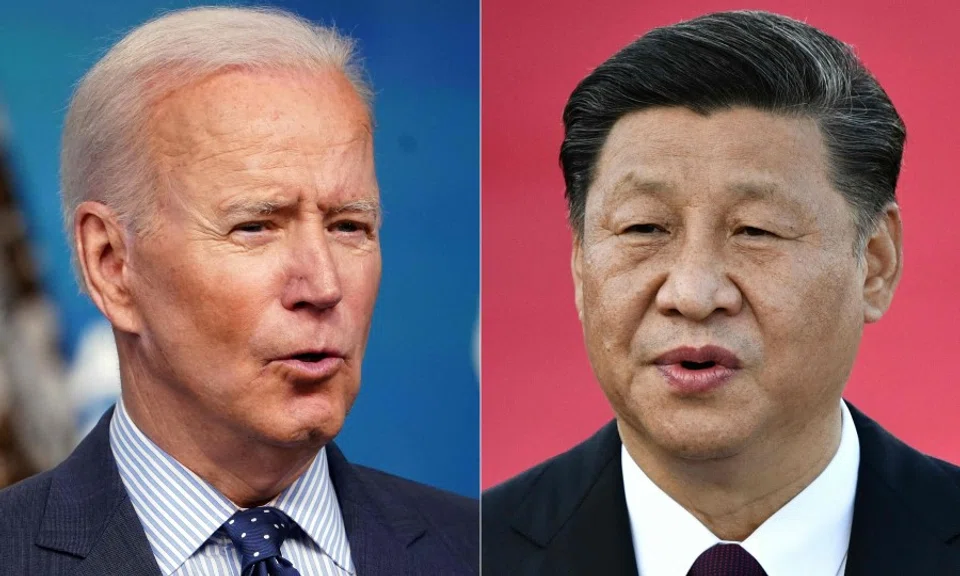
The strong negative shift in American policy against China now dominates US policy in the Indo-Pacific region - one of two top policy arenas of acute US rivalry with China. The other is competition for dominance in the high technology industries that will determine which country will be the world's economic and military leader.
In both critical policy areas, the US seeks to counter Chinese challenges and prevent Chinese dominance and its negative impact on American security and well-being.
Forging domestic and allied consensus on China
American domestic politics drove the sharply negative turn against China.
While continuing to take advantage of many benefits gained from interaction with the existing international order supported by the US, China also continued to challenge a wide range of American interests through often coercive, intimidating, and covert security, economic and diplomatic practices.
These practices eventually prompted a shift in China policy among leaders in Washington that emerged in public view with the Trump administration's National Security Strategy in December 2017.
The shift emerged erratically. Serious division within the Trump administration on economic countermeasures against China prevailed for a time.
President Trump vacillated unpredictably between criticism of China's practices and avowed friendship with China's leader. Bipartisan majorities in Congress proved much steadier in establishing a "whole-of-government" US effort to counter China's challenges.
The Trump administration's punitive tariffs and restrictions on high technology sales to China resulted in the so-called trade war until a truce in December 2018 led to talks resulting in a phase one agreement in January 2020.
But a turning point came with strong American disapproval of the Chinese government's behaviour as the Covid-19 pandemic hit the US with a vengeance in the midst of the presidential campaign of 2020.
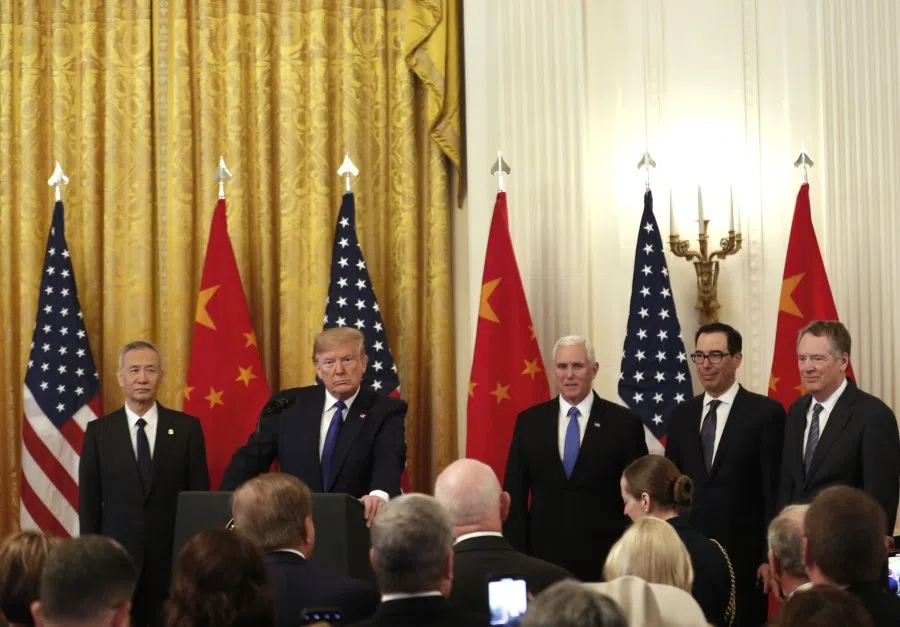
The negative US shift against China ran up against US public opinion in 2019 which showed little support for a tough approach. And mainstream media focused on Trump's antics, frequently neglecting the new policy.
Democratic presidential candidates infrequently discussed China, with Biden prone to disparaging China's capacities relative to the US. National security adviser Jake Sullivan judged that Democrats' lack of attention to China as a danger was correctly in line with US public opinion.
But a turning point came with strong American disapproval of the Chinese government's behaviour as the Covid-19 pandemic hit the US with a vengeance in the midst of the presidential campaign of 2020. Both Trump and Biden emphasised toughness toward China.
Biden administration developments
President Biden took office amid a crescendo of the Trump administration's anti-China actions designed to constrain moderation by the new administration. Congress remained steadfast as it held over many of the 300 legislative proposals targeting China at the end of the 116th Congress. President Biden strongly warned against major dangers posed by China's challenges, while Beijing advanced practices challenging American interests and offering no compromises.
Methodical and well-coordinated statecraft resulted in sustained and sometimes advanced strictures involving trade, human rights and other disputes with China. A substantial change in US strategy towards China awaited policy reviews that remained incomplete or unannounced after nine months in office.
President Biden's priorities in his domestic agenda focused on countering the pandemic, reviving the stalled economy, reducing partisan government gridlock and mass protests undermining the democratic process, and protecting minority rights.
His party had razor-thin majorities in Congress, placing a premium on gaining full support for the administration's very ambitious domestic agenda from all Democrats, including those who strongly opposed multilateral trade agreements and condemned authoritarian regimes abusing human rights and squelching popular democracy.
Coming second, foreign policy involved close cooperation with allies and partners, seeking multilateral solutions on public health, climate change and nuclear non-proliferation, and a priority to US interests in Asia. High-level interchanges with Chinese leaders came only after high-level US consultations with key allies and partners.
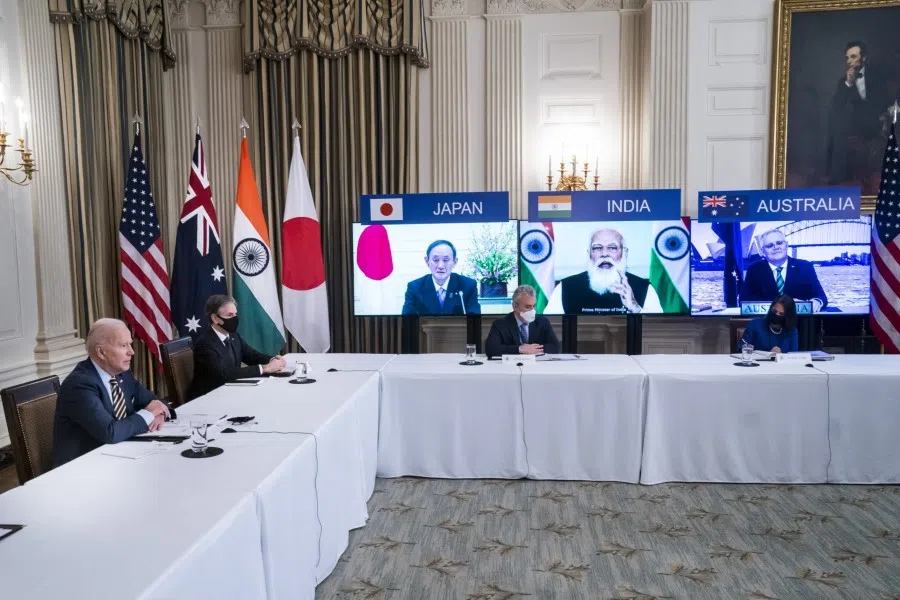
Competing with China in providing vaccinations abroad, the first summit meeting with the Quad dialogue leaders from Australia, India, Japan and the US in March, announced agreement to provide up to one billion doses of Covid-19 vaccine to the Association of Southeast Asian Nations (ASEAN) countries and others by the end of 2022.
The developed countries of the G-7 meetings in May and June gave priority to their differences with China. Top Australian, Indian and South Korean leaders participated as guests at the June summit.
"We can't let them win." - US President Joe Biden
China figured prominently in high-level US discussions with the North Atlantic Treaty Organisation (NATO), the European Union, Japan, South Korea and Australia as the US leaders repeatedly asserted their intention to deal with China's challenges from "a position of strength."
President Biden's summits with the Japanese prime minister in April and the South Korean president in May resolved serious disputes over host nation support, dealt collaboratively with North Korean issues, and targeted China in referring to the South China Sea and Taiwan, the rule of law and freedom of navigation.
Implicitly countering Chinese ambitions, the countries agreed to advance cooperation on new and emerging technologies in building more resilient supply chains.
US reassurance by Secretary of State Antony Blinken and national security adviser Jake Sullivan saw the Philippines carry out their most prominent rebuke of Chinese pressure tactics in many years.
And President Biden sent Christopher Dodd, a former senator and his close friend and alter ego, to show personal support for Taiwan's president.
Biden starkly warned that the main inflection point facing America is the fourth industrial revolution, with China confident that US democratic decision-making processes are less efficient and that its authoritarian system therefore will overtake America. He argued, "We can't let them win."
In Congress, Senate Majority Leader Chuck Schumer led multi-faceted bipartisan legislation in 2021 to improve US high technology industries and advance other measures to counter China. He advised, "We can either have a world where the Chinese Communist Party determines the rules of the road... or we can make sure the United States gets there first." Meanwhile, mainstream media and public opinion strongly supported tough policy while scattered opposition proved weak.
The controversy surrounding the rushed US and allied withdrawal from Afghanistan in August 2021, in the face of unexpected rapid collapse of the Afghan government's resistance and Taliban's sweeping takeover in the country, undermined the US's position as a world leader and damaged President Biden's political standing.
But the Biden government's resolve against Beijing's challenges was underlined by the surprise announcement on 15 September, of a new and more rigorous US security relationship with Australia and Great Britain that involves the sale of tightly held US nuclear submarine technology and closer collaboration in dealing with China.
In October, US Trade Representative Katherine Tai announced little change in existing trade policy, disclosing that the Trump government's punitive tariffs would be continued.
Tensions in the Taiwan Strait rose with unprecedented shows of force by large numbers of Chinese warplanes intruding into Taiwan's air defence identification zone, providing the background for a meeting in Switzerland between Jake Sullivan and his Chinese counterpart Politburo member Yang Jiechi announcing that plans were underway for a virtual summit meeting between the two presidents.

China-US rivalry in Southeast Asia - America is losing
Despite the Biden government garnering support in its competition with China from Australia, India, Japan, South Korea and Taiwan as well as European and NATO allies and partners, the competition is unwelcome or viewed warily in Southeast Asia. It adds to reasons explaining the recent US decline relative to China in Southeast Asia.
China has distinct advantages with extensive borders with Southeast Asian neighbours and control of major rivers of utmost importance to neighbouring states. It is the largest trading partner and second largest source of financing for infrastructure in Southeast Asia. Southeast Asian states are deeply invested in China while China's investment in the region has grown impressively over the past decade.
China ably controls and asserts its enormous claims to most of the South China Sea against much weaker capacities of Southeast Asian claimants.
China is widely seen as the engine of economic growth for the region. The Belt and Road Initiative (BRI) provides much-needed financing and construction capacity. The Chinese party-state's overt and covert organs increased greater influence over the important ethnic Chinese diaspora in Southeast Asia, using this leverage to promote its objectives.
Beijing exerts a strong influence on governments increasingly dependent on Chinese transportation, communication and other infrastructure.
As seen in scandals in the Philippines earlier and Malaysia more recently, and in Asia Society and other investigative reports about Myanmar, Cambodia and others, Beijing routinely accommodates corrupt practices by regional leaders in economic agreements under the BRI rubric that benefit those leaders and Chinese interests at the expense of the host country's overall national interests.
China also works to establish its leadership through penetrated local media, numerous Confucius Institutes and student exchanges. Chinese tourists dominate this industry in Southeast Asia.
In competing with China, the US economic position in Southeast Asia has several strong points. US two-way trade with the region reached US$308 billion in 2020, and US investment in the region between 2015 and 2020 was US$111 billion, more than any other country.
US close ally Japan is among ASEAN's largest trading partners and between 2015 and 2020 Japan put US$102 billion in FDI into ASEAN, more than China.
In the recent past, the US was viewed as the region's most important strategic power and a leading economic power, but now opinion overwhelmingly sees China as the most influential.
Strategically, the US sustains (albeit sometimes troubled) alliance relations with the Philippines and Thailand, a significant military presence in and cooperative security relationship with Singapore, and active military and other security exchanges with Vietnam, Malaysia and Indonesia.
Regarding two Southeast Asian strategic centres of gravity, US forces guard against disruptive changes in the Indian Ocean approaches to the Malacca Strait, and they challenge China's illegal expansionism in the South China Sea.
US allies Japan and Australia and close partner India in the Quad pursue complementary efforts to build strategic capacities among themselves and with Southeast Asian countries to defend their maritime rights and interests challenged by China.
Nonetheless, American achievements fail to change prevailing media discourse in the region which views China as ascendant and the US in decline. In the recent past, the US was viewed as the region's most important strategic power and a leading economic power, but now opinion overwhelmingly sees China as the most influential.
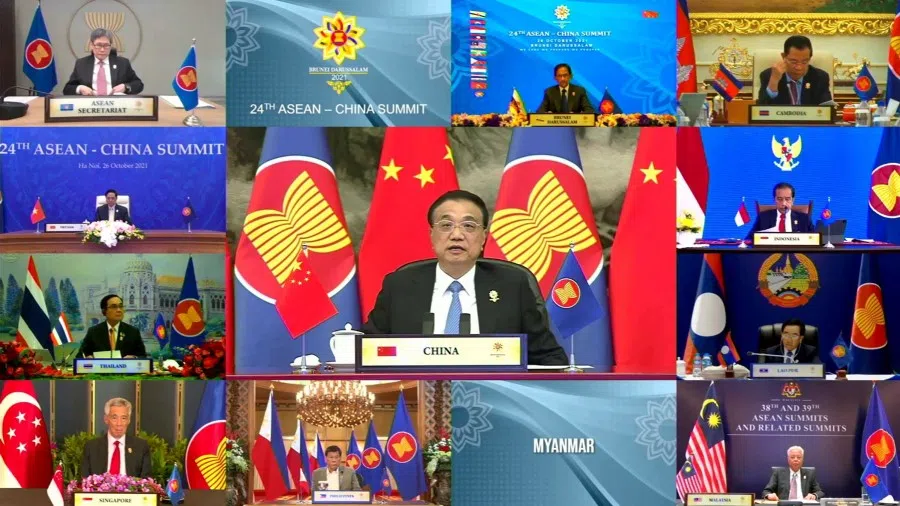
Regional asymmetry shows in widespread criticism of US actions but silence on issues sensitive to Beijing. Chinese client states Cambodia and Laos block efforts by others to get ASEAN to defend Southeast Asian claimant states' jurisdiction in their maritime zones against China's nine-dash line claim in the South China Sea. The claim was deemed illegal by an international law of the sea tribunal five years ago, but Beijing's pressure saw regional governments and ASEAN generally avoiding discussions on the ruling.
A decade ago, US observers commonly judged that talks between China and ASEAN on a code of conduct in the South China Sea would stabilise the situation in line with the interests of the Southeast Asian claimants and the US. Today, a common expectation is that China may so dominate the discussion that the code may well have provisions supported by China barring military activities by the US.
For its part, the US struggles for relevance in contemporary regional discourse. US policy-making is seen in Southeast Asia as devoting only episodic attention to the area. Serious US internal problems depict a nation poorly positioned to lead abroad.
Among specific shortcomings, US domestic preoccupations slow the often halting pace of congressional approval of delayed administration appointments for ambassadors throughout Southeast Asia, and senior State departments and other policy makers.
Most regional states and commentary ignore the benefits for Southeast Asia provided by the US, including extensive investment noted above and foreign assistance - both much larger than comparable Chinese efforts.
The US government does not have the funds to compete with the BRI. Progressive Democrats oppose multilateral trade agreements, yet their support is essential for President Biden's domestic legislative priorities.
As a result, it remains unlikely that the Biden government will join the Comprehensive and Progressive Agreement for Trans-Pacific Partnership (CPTTP) which Beijing now seeks to join, even though US membership in this trade pact would provide an economic programme attractive to the region and competitive with China.
Similarly, progressive Democrats and others in Congress demand US foreign policy emphasis on democracy and human rights which is not well received by most regional states and especially limits US flexibility in dealing with the military junta in Myanmar.
Against this background, recent US efforts to increase attention to Southeast Asia in order to counter Chinese challenges remain unattractive to Southeast Asian states seeking Chinese blandishments and wary of provoking Chinese punishment.
Most regional states and commentary ignore the benefits for Southeast Asia provided by the US, including extensive investment noted above and foreign assistance - both much larger than comparable Chinese efforts.
The Biden government's early record of US actions in Southeast Asia did not reverse this perceived US decline. In Southeast Asia, senior US officials were attentive, in support of the Philippines challenging Chinese security forces in the South China Sea, but their attention to Southeast Asian states and ASEAN overall remained low.
In the first half of 2021, extensive high-level consultations with Japan, South Korea, India, Australia, European leaders and even Taiwan stood in stark contrast with ASEAN and individual ASEAN states until a flurry of Cabinet-level meetings with ASEAN counterparts in August 2021, capped with Vice-President Kamala Harris visiting Singapore and Vietnam. But this high point was overshadowed by global controversy over the panic and distress seen during the concurrent US withdrawal from Afghanistan.
Biden's continued determination to counter China in Asia was reinforced by the surprise announcement in September of an agreement on close US alignment with both Australia and Great Britain on a range of sensitive security matters targeting China, notably including a multi-billion dollar nuclear submarine sale.
Yet, Southeast Asian governments reacted warily with only the Philippines openly supporting, Malaysia and Indonesia publicly criticising, and Vietnam and Singapore being ambivalent.
The coup in Myanmar in February and its resulting widespread civil turmoil and significant armed resistance worked against US competition with China. Consistent with congressional preferences, the Biden government emphasised sanctions against abusive military leaders in Myanmar.
ASEAN reportedly sought ways to engage both China and the US to strengthen ASEAN centrality in dealing with the Myanmar crisis. Preserving good relations with the Myanmar junta, China was attentive in cooperating with ASEAN.
A scheduled virtual ASEAN foreign ministers' meeting with Secretary Blinken in late May was cancelled because of last-minute technical difficulties. In contrast, China's foreign minister hosted an in-person meeting with ASEAN counterparts in early June, one of many such meetings the minister has had with ASEAN counterparts in 2021.
Blinken's rescheduled virtual meeting with ASEAN counterparts over Myanmar in July avoided more direct US leadership in dealing with the problem.
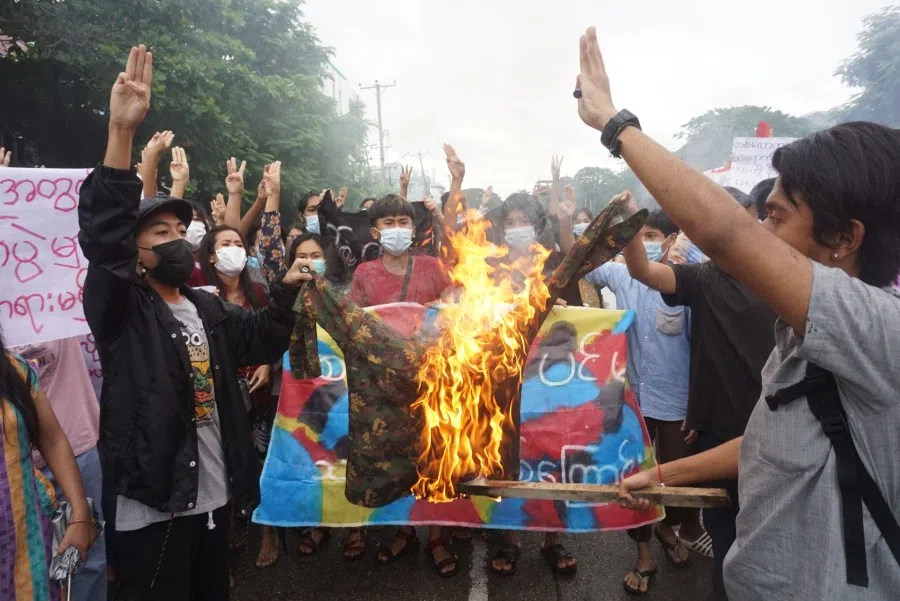
Defence Secretary Lloyd Austin's visit to the Philippines in July came amid substantial US military and vaccine assistance, which led to mercurial President Rodrigo Duterte's decision to restore the visiting forces agreement which he had threatened to end.
Austin's and Harris's visits to Singapore and Vietnam highlighted important initiatives on providing Covid-19 vaccines, and closer US engagement on economic recovery, climate change and maritime security.
Nevertheless, the effectiveness of US activism in assisting the top US priority of countering China's challenges remained limited, notably by Southeast Asian reluctance to offend Beijing. How far even Vietnam, the country with the most to lose if China dominates Southeast Asia, will go to avoid offending China seemed evident when Hanoi allowed the Chinese ambassador to publicly meet the Vietnamese prime minister with a donation of vaccines, upstaging Harris who hours later began her visit and offered vaccines.
...it is more likely that the Biden administration will focus on working with willing partners to counter Chinese challenges, notably the Quad powers.
Outlook
For now, the Biden administration seems determined to continue advancing relations with Southeast Asia in areas those governments believe will not seriously upset Beijing.
Some specialists argue the US has no choice but to stay actively involved as Southeast Asia is perhaps the world's most important channel of international trade and the region is on track to become the world's fourth largest economy. This view holds that outside countries capable of expanding and deepening their economic relationships in Southeast Asia will write the rules and set the standards for future development, trade, and investment.
How such an approach supports the high priority that Washington accords to countering China's challenges is hard to demonstrate. Over time, such an approach may win over Southeast Asian governments which reportedly register keen anxiety in private over the region's growing dependence on and deference to China's overwhelming national interests, and over an increasingly China-dominated sphere of influence.
Indeed, China appears resolved in using a combination of blandishments and coercion in advancing control in regional affairs. And the US government may come up with a strategy that meets the needs of the Southeast Asian states while also serving to counter Chinese challenges.
However, in this time of acute US preoccupation with critically important domestic issues and blowback from the Afghanistan withdrawal, it is more likely that the Biden administration will focus on working with willing partners to counter Chinese challenges, notably the Quad powers.
Meanwhile, allowing Southeast Asia and ASEAN to face more directly the risks of Chinese dominance may incentivise some important regional countries to take steps that will encourage the US to sustain strong relations with them in the interest of preserving their autonomy and national rights.
This article was first published by ISEAS - Yusof Ishak Institute as ISEAS Perspective 2021/138 "Why US Rivalry with China Will Endure: Implications for Southeast Asia".




